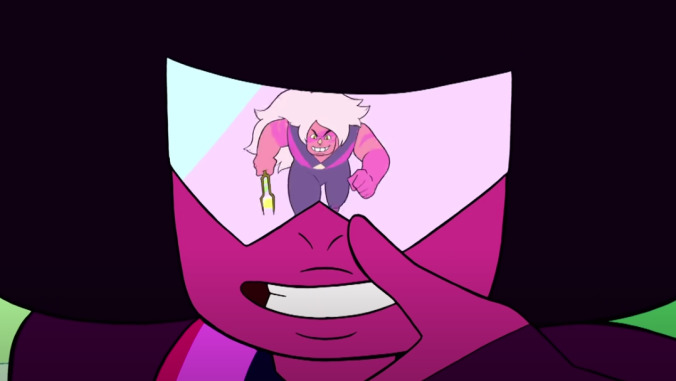Rebecca Sugar says Cartoon Network told her not to talk publicly about Steven Universe's LGBTQ+ material

Cartoon Network’s Steven Universe is a landmark show in the history of LGBTQ+ representation in kids’ entertainment—normalizing the notion of same sex relationships so thoroughly that one of the show’s main characters is the literal living incarnation of one. All of which stemmed directly from the goals and drives of the show’s creator, Rebecca Sugar, and in the face of initial opposition from the show’s owners at the network.
This is per an interview Sugar gave to Paper this week, speaking alongside Noelle Stevenson from She-Ra: Princesses Of Power, who openly acknowledged the ways Steven influenced the later Netflix show. “Even the conversations that we were having at the beginning of our plans for including queer characters and relationships was only possible because Steven Universe had done it first,” Stevenson notes early on, adding that she’d tell executives, “Look, this is working, this is getting support, fans are into this and it’s getting this reaction.”
Sugar, meanwhile, had to thread some executive concerns of her own, stating that her initial goal with SU was to expand on some of the work she’d done with the characters of Princess Bubblegum and Marceline on Adventure Time. Sugar says she very deliberately made the character of Garnet a core part of the show’s dynamic, so that, when it was revealed at the end of the first season that Garnet was composed of a “fusion” between two female characters, there’d be no way for Cartoon Network to remove her from the series. Which didn’t stop them from trying to downplay the romantic nature of the relationship between Ruby and Sapphire (Garnet’s component parts).
Around 2012 and by 2014 when we actually introduced Garnet’s components, the characters of Ruby and Sapphire, the studio started to understand what we were doing. They told us point-blank, “you can’t have these characters be in a romantic relationship,” but at that point Garnet was so established that audiences could instantly understand what the relationship was, the song had already been written, the episode had already been boarded so we were already in full production. I’m really proud of the patience we had and the time that we took to fully explore these characters at a time when that was not necessarily possible.
Even then, though, Sugar was told not to talk publicly about the show’s LGBTQ+-related material and themes. “They basically brought me in and said ‘We want to support that you’re doing this but you have to understand that internationally if you speak about this publicly, the show will be pulled from a lot of countries and that may mean the end of the show,’” Sugar said. “They actually gave me the choice to speak about it or not, to tell the truth about it or not, around 2015/ 2016, by then I was honestly really mentally ill and I dissociated at Comic Con. I would privately do drawings of these characters kissing and hugging that I was not allowed to share. I couldn’t reconcile how simple this felt to me and how impossible it was to do, so I talked about it.”
In fact, Steven Universe has been pretty heavily censored in other countries, often for material relating to its handling of romantic relationship. But the show has thrived on the internet, with Sugar acknowledging the large part that its fandom has played in keeping it on the air during its most contentious days: “The show survived in a large part because of the support from fans.”